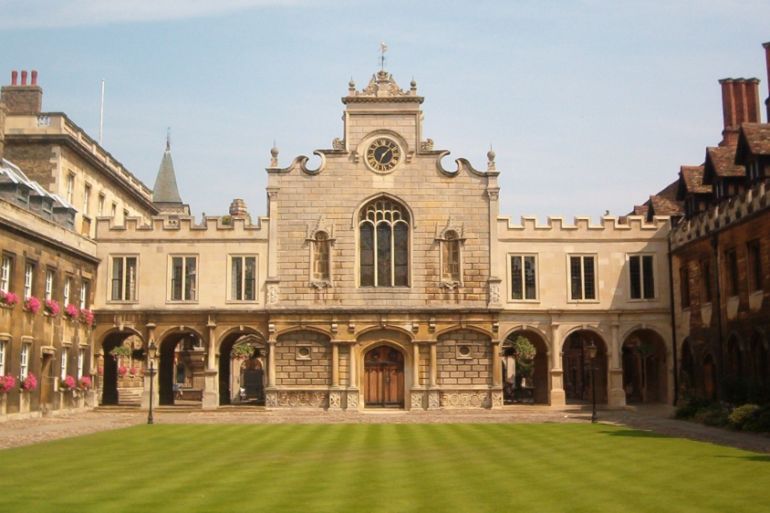Cambridge slammed for ‘censoring’ Palestine BDS event
Activists condemn university’s alleged threat to stop the event unless Palestinian academic chairing it was removed.

The University of Cambridge is facing accusations of censorship after it allegedly threatened to ban a meeting about the Boycott, Divestment, and Sanctions (BDS) movement unless the Palestinian academic chairing it was removed and replaced with its own choice.
Ruba Salih from the School of African and Oriental Studies (SOAS) was set to oversee Wednesday’s event featuring Palestinian BDS activist, Omar Barghouti, but organisers say they were forced to cancel her participation hours before it was due to start after the university intervened citing concerns over her neutrality.
Keep reading
list of 4 itemsChina trying to develop world ‘built on censorship and surveillance’
Pakistan says it blocked social media platform X over ‘national security’
Media feel pressure to tell ‘positive’ China story as party tightens grip
Palestinian activists say the incident highlights the increasingly restrictive atmosphere for critics of Israel on campuses across the UK.
Ed McNally, the Cambridge student who organised the event, told Al Jazeera that the university was “undoubtedly” violating its commitment to free expression.
“Removing a respected Palestinian academic as chair of a panel event based on an unsubstantiated assumption about her lack of ‘neutrality’, and in doing so bowing to external pressure from a pro-Israel lobby group, cannot be construed as anything other than a naked attack on free speech and, more particularly academic freedom,” McNally said.
Hundreds of students and academics have signed an open letter condemning Salih’s removal as chair of the event.
In an email exchange, a university spokesperson told Al Jazeera that the institution is “fully committed to freedom of speech and expression”.
“We have no reason to believe that these events are in any way unlawful,” the spokesperson said, adding: “In this instance, following calls from the organisers for extra safety measures, a neutral chair was provided to ensure that all sides were represented in what is an important and often emotionally charged debate.”
Al Jazeera asked the university to explain why Salih was not considered a neutral choice for chair, but the institution issued no further comment.
The SOAS academic said she had not received any explanation from the university for why she was not considered an appropriate chair.
“I don’t know the exact terms under which my role as chair was defined as inappropriate for the debate, and which narratives the university has used for the forced replacement of the chair,” she said.
‘Vocal support for Palestine’
Palestinian activists at Cambridge are not alone in thinking they are subject to unfair restrictions and even censorship by universities.
In the past year, Al Jazeera has reported on similar incidents at universities across the country, including the University of Manchester and the University of Central Lancashire, among others.
In Manchester, a freedom of information request filed by the activists revealed that the university had agreed to censor the title of talk given by a Holocaust survivor after a meeting with the Israeli ambassador to the UK, Mark Regev.
The organisers of the Cambridge event said the university had intervened after pressure from pro-Israel lobby groups.
“Having essentially abandoned the battle for ‘hearts and minds’, Israel and its supporters are resorting to legal warfare and lobbying for the suppression of speech,” McNally said.
“As seen at Cambridge this week, and in pressure successfully applied by the Israeli ambassador on the University of Manchester to censor events on Palestine, these efforts are manifest on university campuses.”
The second-year history student also said he believed the British government’s Prevent programme for countering what it terms “extremist” ideology was to blame for censorship of Palestinian events on campus.
Under guidelines issued by the government to tackle views considered “extremist”, universities are asked to consider “vocal support for Palestine” as an indicator of “extremist” views that must be risk-assessed and managed.
‘Deeply disturbed’
Cambridge academic Anne Alexander said the requirements for neutral event chairs did not seem to apply when the Israeli ambassador spoke at Cambridge.
“The stipulation that there must be a ‘neutral’ or ‘independent’ chair seems to be only applied to certain types of event, and this smacks of double standards,” she said.
I am...deeply disturbed that in both these cases a female BME academic colleague has been told essentially that she is incapable of acting as a fair and honest chair of the discussion
|
|
On Tuesday, Alexander had attended another event featuring Barghouti at the London School of Economics (LSE), which faced similar restrictions to the event in Cambridge.
In that event, LSE academic Aya Cubukcu was replaced by her colleague, Professor Eric Neumayer, after officials at the institution demanded an “independent” chair.
Alexander shared a copy of an email she had sent to Cambridge University administrators with Al Jazeera, in which she raised her concerns regarding Salih’s removal as chair.
“I am … deeply disturbed that in both these cases (Cambridge and LSE) a female BME (Black and minority ethnic) academic colleague has been told essentially that she is incapable of acting as a fair and honest chair of the discussion,” she wrote, further asking the officials if they had any evidence to support the notion Salih could not chair the meeting appropriately.
“Please can you explain to me why students and academics who are supporters of a non-violent campaign which simply calls on Israel to respect international law are being treated in this way?”
Follow Shafik Mandhai on Twitter: @ShafikFM
|
|